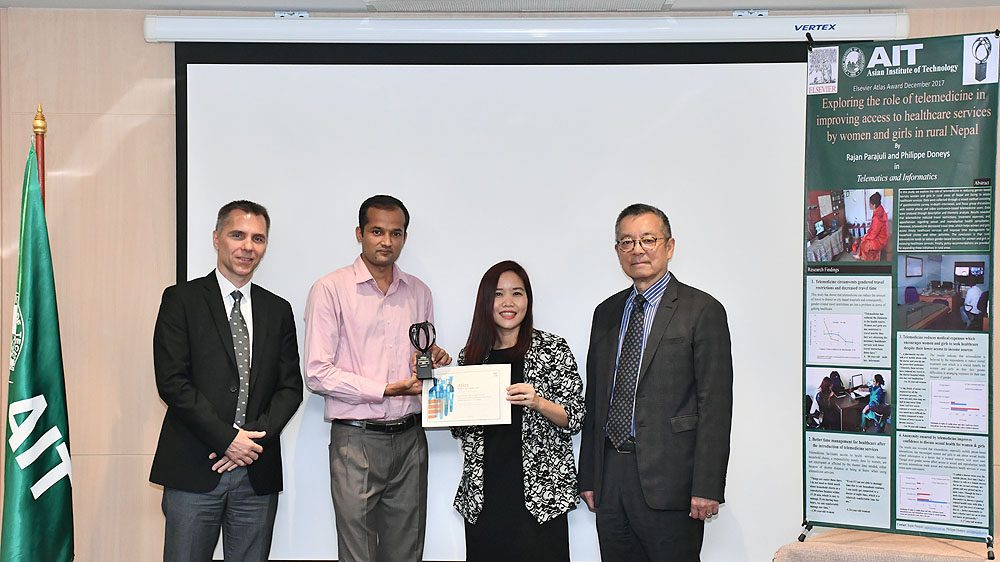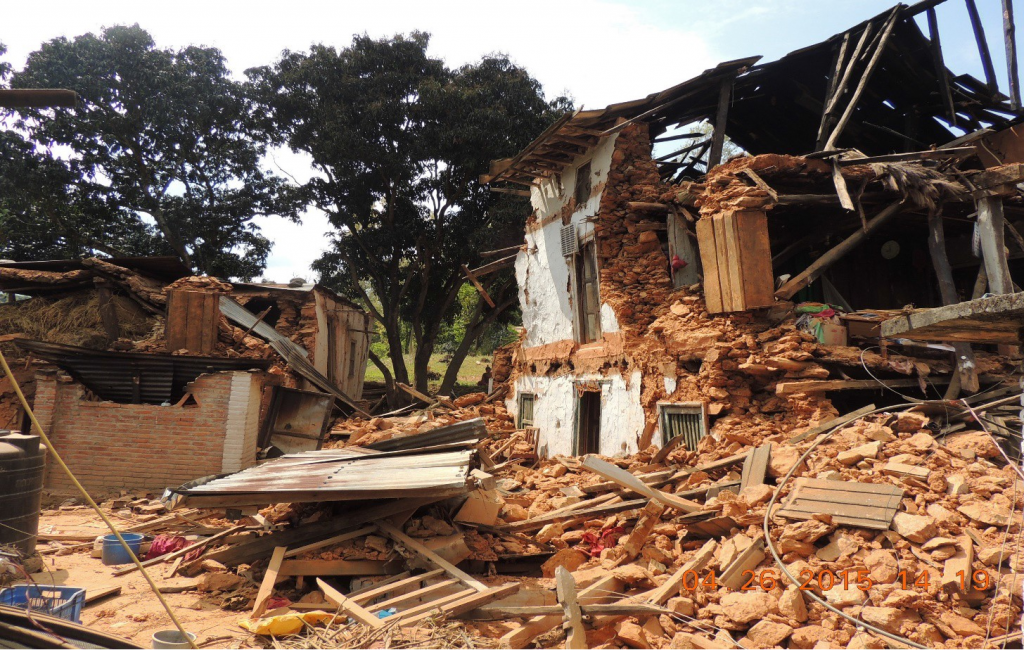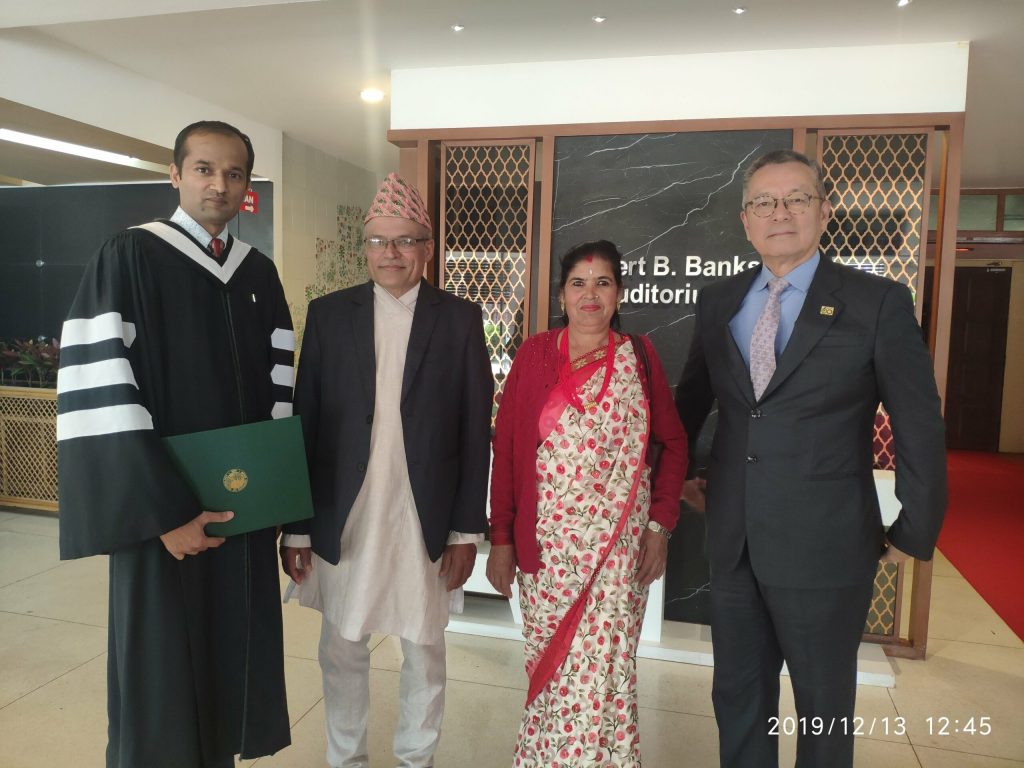By Mae Thiwari
AIT Gender Development Studies alumnus, Dr. Rajan Parajuli, is bringing gender perspective into improving Nepal's research and education through a global network dedicated to research and education. Understanding that gender equality is important for sustainable development, he also works to ensure technology serves women in the rural areas with telemedicine initiatives in Nepal.
Dr. Rajan Parajuli started working at Nepal Research and Education Network (NREN) as a Program Officer in 2009. NREN provides research and education network connections that link researchers, teachers, and students in Nepal with researchers and academic communities across the world. In addition, NREN activities encompass the uses of ICT in education, health, and other domains of sustainable development.

Dr. Parajuli explains that working in technology – a largely male-dominated domain, with a background in social science – Rural Development, has enabled him to see how the two disciplines could be complements for building a better future. Given his personal experience of growing up in a rural area of Nepal and being aware of gender inequality, Dr. Parajuli decided to further his studies in Gender Development with the Asian Institute of Technology (AIT).
“I grew up witnessing gender bias in everyday life, which is a major hindrance for the development of the community and the nation. Similarly, technology, especially ICTs which is a major agent of current as well as future development was largely overlooked from the gender perspective. That’s the reason I chose to study in Gender and Development,” said the Executive Director of NREN.
Having collaborated with Professor Kanchana Kanchanasut through his work at NREN, Dr. Parajuli was put in touch with Associate Professor Phillippe Doneys – with whom he had shared his research proposal and became his academic advisor for his PhD in Gender Development Studies. In 2018, Dr. Parajuli and Assoc. Prof. Doneys co-wrote an article titled “Exploring the role of telemedicine in improving access to healthcare services by women and girls in rural Nepal” that was chosen for the Elsevier Atlas Award from more than 3800 academic journals.
 While collecting data for his research in Nepal in 2015, a massive earthquake that killed nearly 9,000 people and injured nearly 22,000 people also shook Dr. Parajuli’s home to collapse completely. Fortunately, he was able to evacuate his family to safety in time. “AIT family swiftly initiated relief support to Nepalese people. The support was coming from AIT alumni, faculty and staff,” said Dr. Parajuli as he explained the most memorable support from AIT. He further added, “AIT is a bit different from other universities because the people there do not only think about the students, but also the student’s families, and their countries as well. This is the kind of thing that I appreciate the most and will never forget.”
While collecting data for his research in Nepal in 2015, a massive earthquake that killed nearly 9,000 people and injured nearly 22,000 people also shook Dr. Parajuli’s home to collapse completely. Fortunately, he was able to evacuate his family to safety in time. “AIT family swiftly initiated relief support to Nepalese people. The support was coming from AIT alumni, faculty and staff,” said Dr. Parajuli as he explained the most memorable support from AIT. He further added, “AIT is a bit different from other universities because the people there do not only think about the students, but also the student’s families, and their countries as well. This is the kind of thing that I appreciate the most and will never forget.”
During the Earthquake, AIT’s IntERLab had sent DUMBO Routers, an emergency communication network system, to assist the country for their disaster relief efforts. Dr. Parajuli along with support from network engineers from NREN helped deploy these equipment's in a few hospitals. The system had facilitated local communication among doctors and other staff in the hospitals and rescue camps.
Returning to AIT after his field study, Dr. Parajuli allowed for extra hours of student assistantship to help pay for the remaining tuition fees and also for managing his living expenses in Thailand. He also brought with him his young family. The safe and international environment at AIT allowed him to concentrate on his studies without worrying about his family. His son, who was five years old at the time, went to AIT International School on campus and still remembers his friends from different countries and the wonderful time he had at AIT.
After graduating from AIT, Dr. Parajuli was offered a director position at NREN where he was a Manager previously. He was later promoted to his current position as the Executive Director, responsible for expanding the network nationally and building partnerships internationally along with day-to-day organizational governance.

“After my appointment as the director, I try to apply what I’ve learned to my work by developing projects related to technology and gender,” Dr. Parajuli explained how technology is gendered by design and having a gender lens helps improve access to technology from planning to implementation. In addition, he is currently working for the sustainability of telemedicine activities in Nepal, which is also his core research area. He is in touch with his professors at AIT and trying to develop projects that address the issues related to gender and technology in Nepal. Development cannot be sustainable, after all, if both, women and men, are not enabled or allowed to be active contributors to the development.
----

